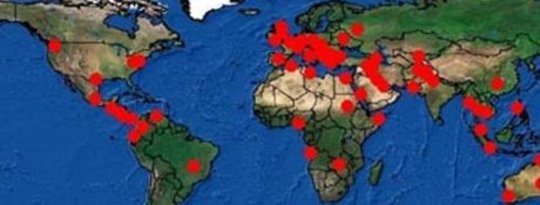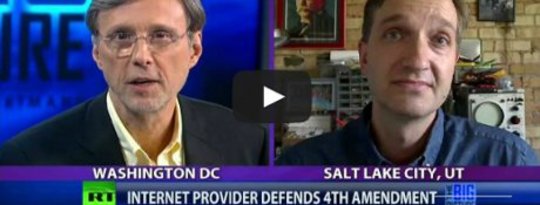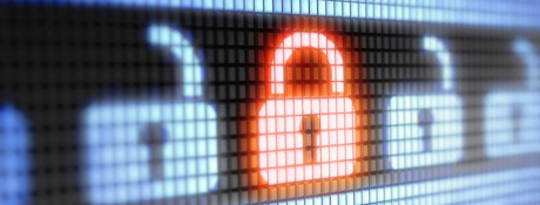The real problem with the NSA spying program is not that objectionable when used to catch "real" terrorism suspects or prevent actual attacks, a knack these programs have not yet accomplished that warrant the spending and effort put forth so far. Now the real problem is the slippery slope the NSA program provides. And it is slippery as other agencies are following NSA's lead and their own agendas.

Guardian Exclusive: Spy agency has secret backdoor permission to search databases for individual Americans' communications. The National Security Agency has a secret backdoor into its vast databases under a legal authority enabling it to search for US citizens' email and phone calls without a warrant, according to a top-secret document passed to the Guardian.

When the House of Representatives recently considered an amendment that would have dismantled the NSA's bulk phone records collection program, the White House swiftly condemned the measure. But only five years ago, Sen. Barack Obama, D-Ill. was part of a group of legislators that supported substantial changes to NSA surveillance programs. Here are some of the proposals the president co-sponsored as a senator.

The PRISM scandal confirmed our worst fears when it comes to state-level surveillance of the Internet, with the revelation that the NSA has created "backdoors" into major online services such as Google, Facebook, and Yahoo. These backdoors allegedly give intelligence agencies around the world access to user emails, Facebook posts, search queries, web history, and more, with little or no judicial oversight.

When Rochelle Bing bought her modest row home on a tattered block in North Philadelphia 10 years ago, she saw it as an investment in the future for her extended family — especially for her 18 grandchildren. Bing, 42, works full-time as a home health assistant for the elderly and disabled. In summer when school is out, her house is awash with grandkids whom Bing tends to while their parents work. And the home has been a haven in troubled times when her children needed help or a father went to jail. One of Bing's grandchildren lives there now.

CNET has learned the FBI has developed custom "port reader" software to intercept Internet metadata in real time. And, in some cases, it wants to force Internet providers to use the software.

A top secret National Security Agency program allows analysts to search with no prior authorization through vast databases containing emails, online chats and the browsing histories of millions of individuals, according to documents provided by whistleblower Edward Snowden.

Although the House defeated a measure that would have defunded the bulk phone metadata collection program, the narrow 205-217 vote showed that there is significant support in Congress to reform NSA surveillance programs. Here are six other legislative proposals on the table.

On July 23, 2013, Senator Wyden's gave remarks on NSA domestic surveillance and the PATRIOT Act at the Center for American Progress. In his speech Wyden warns that "if we don't seize this unique moment in history to reform our surveillance laws and practices, we will all live to regret it."

Pete Ashdown, XMission, joins Thom Hartmann. Believe it or not - there are some internet companies who actually care about your privacy.

Among the snooping revelations of recent weeks, there have been tantalizing bits of evidence that the NSA is tapping fiber-optic cables that carry nearly all international phone and Internet data.

The European Parliament is gearing up to launch an investigation into the recently revealed NSA surveillance programs—and lawmakers are drawing up an interesting list of witnesses who they want to invite to interview about the snooping.
- By Ralph Nader

Privacy is a sacred word to many Americans, as demonstrated by the recent uproar over the brazen invasion of it by the Patriot Act-enabled National Security Agency

As Congress holds its second major public hearing on the National Security Agency’s bulk spying, we speak with Glenn Greenwald, the Guardian journalist who first published whistleblower Edward Snowden’s revelations. The NSA admitted their analysis of phone records and online behavior far exceeded what it had previously disclosed.

While President Obama insists that nobody is listening to your telephone calls, cybersecurity expert Susan Landau says the metadata being collected by the government may be far more revealing than the content of the actual phone calls.
- By Amy Goodman

A debate: Chris Hedges, a senior fellow at The Nation Institute and former Pulitzer Prize-winning foreign correspondent for The New York Times, and Geoffrey Stone, a professor at the University of Chicago Law School. Is Edward Snowden a Hero?

Thom Hartmann talks with Andrea Peterson, tech reporter for the Think Progress Website about a massive online surveillance program you probably haven't heard of.
- By Chris Hayes

Chris Hayes talks about the recent history of government surveillance in America with famed civil rights activist Julian Bond, Maya Wiley of the Center for Social Inclusion, and former deputy White House press secretary Bill Burton.
- By Amy Goodman

The National Security Agency has obtained access to the central servers of nine major Internet companies — including Google, Microsoft, Apple, Yahoo! and Facebook.

Anyone who has been paying the least bit of attention was aware that the government was extending their reach into the ordinary citizen privacy drip by drip. However, yesterday's revelation by The Washington Post and The Guardian. What's unclear is what other data mining is being accomplished by whom and for what purpose.
- By Bill Moyers

Glenn Greenwald adds a new dimension to troubling questions about government secrecy, overreach, and what we sacrifice in the name of national security.
- By Amy Goodman

In the desirability of factory farming debate, regardless of which side you come down on, the idea of criminalizing whistle-blowing and reporting of illegal activities is a dangerous precedent.

An out of control Congress beholden to special corporate clients threatens to criminalize most internet use.















